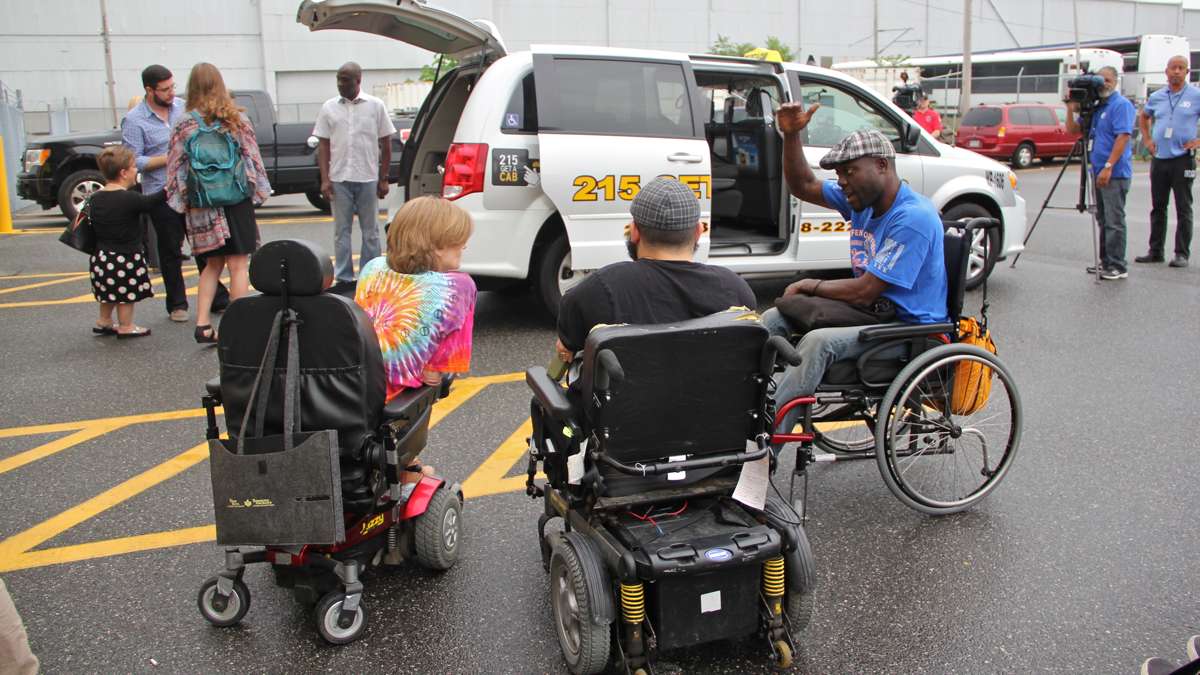Remembering the difficult days before the Americans with Disabilities Act

Accessibility activists gather on July 2 to witness Philadelphia's introduction of new wheelchair accessible taxis. (Emma Lee/WHYY)
Most people know that George H.W. Bush signed the Americans with Disabilities Act into law 25 years ago. One of the instigators of the law was then Attorney General Richard Thornburgh, whose son was physically and developmentally disabled as a result of a car accident. I can’t help but to wonder what would have happened if there was no Dick Thornburgh instigating this sea change for so many of us based on his own personal experience.
I became a quadriplegic in the waning days of 1979, 10 years before the ADA was signed into law. I was a 33-year-old married man with two young daughters. Fortunately, I was already a psychologist, so I had a profession to fall back on.
After spending several months at Jefferson Hospital in Philadelphia, I was transferred to Magee Rehabilitation Hospital, where I would spend the next six months learning how to live with this body. I spent all of those months in a facility with people who understood my physical needs, who had resources available to me when I needed them. I was with a group of patients who had similar experiences. It was safe — but it wouldn’t always be that way.
As I was getting closer to discharge, we had an outing in nearby Chinatown, so that I could get a sense of what life was like outside of the safety of Magee. There were no curb cuts, so my physical therapist had to lift my manual wheelchair up and down every corner. We chose the restaurant we did because they assured us that someone in a wheelchair could easily get in. When we arrived, it “only had a few steps,” according to the manager. (This still happens today, although much less frequently.)
To be honest, that outing reinforced my painful belief at the time that I was a freak of nature. After all, in those days, people hadn’t seen many quadriplegics. How could they? Most of us were stuck in our homes or in nursing homes.
Six months later, I returned to work at a local psychiatric hospital, where I had been directing their outpatient drug treatment program. Getting into the building required navigating about 25 steps! Fortunately, my nurse was incredibly strong, and he could get me up and down those steps.
I complained to my employer and asked to get a wheelchair lift installed. Instead, they offered me an office in a wheelchair-accessible building about 200 yards away from the program I was running. Never a big fan of being isolated and deprived of the ability to do my work efficiently, I pushed on. I insisted on a wheelchair lift. I was told it was too expensive and they didn’t have to do this, that all they had to do was give me an office somewhere. That was in 1983.
Back then I was a hockey fan, so I went to the old Spectrum Arena quite often. The only place I could fit was under an overhang behind the last row. So throughout the game I had to sit sideways with my head bent over.
After the ADA, I almost wept when I saw the new Wachovia (now Wells Fargo) Center and the new Citizens Bank Park. I could actually see what was happening in the field and be comfortable at the same time! Over the next several years, I began seeing curb cuts and ramps leading to businesses and restaurants.
And now, a few cabs in Philadelphia are wheelchair accessible with the promise of more to come. I can now get on Amtrak and subways in many cities. I’ve experienced wheelchair-accessible national parks and have been able to rent wheelchair vans in most cities in this country. I have even used voting booths that are completely wheelchair accessible — something I couldn’t even imagine 10 years ago.
Most important, people with disabilities are no longer freaks of nature. We are commonplace. We are finally part of our community.
I’m grateful to all who came before me. And I’m grateful for all of my cohorts who are making it better for those who come after me.
But I still can’t help but to wonder about Dick Thornburgh’s son. What if …?
—
Another version of this essay was published in the Huffington Post.
Dan Gottlieb is the host of WHYY’s Voices in the Family.
WHYY is your source for fact-based, in-depth journalism and information. As a nonprofit organization, we rely on financial support from readers like you. Please give today.

